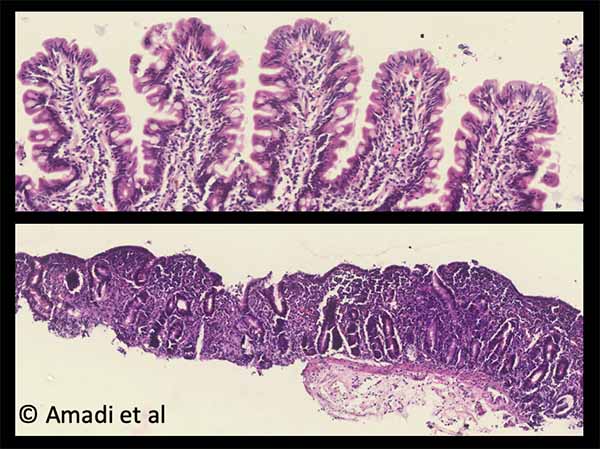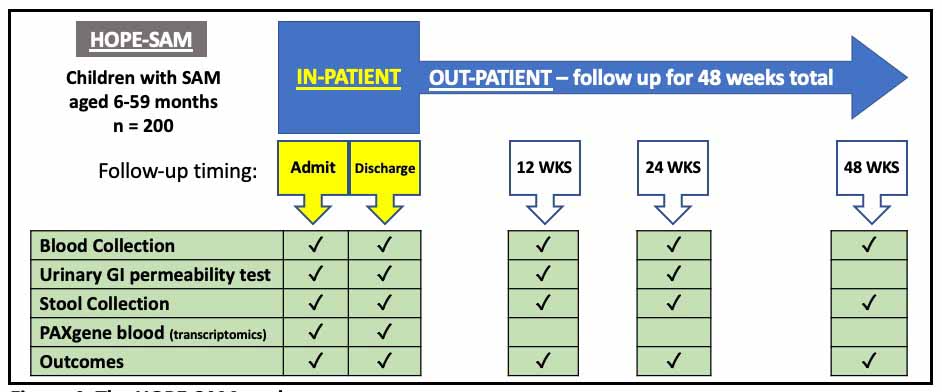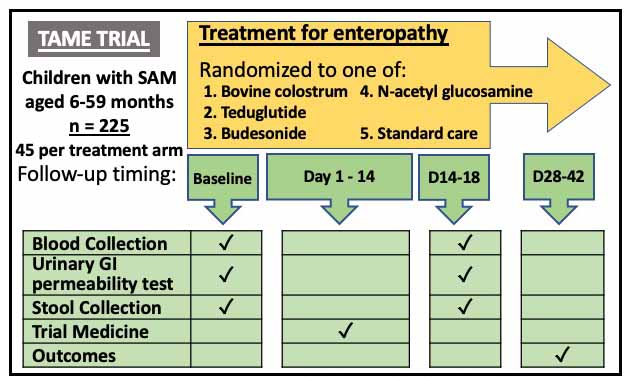
Gut and immune function in SAM
Location: Zvitambo, Zimbabwe; Group: Prendergast Group
I am conducting research in children with severe acute malnutrition (SAM). This is an extreme form of malnutrition which involves many of the organ systems of the body. Being this underweight means that patients are at significant risk of mortality, and those that survive can suffer serious problems that affect their quality of life. We know that children with SAM have problems with some key body systems:
- Gut: Their guts are more leaky, their gut wall is less good at absorbing nutrients, and their gut bacteria changes.
- Immune system: There is evidence of inflammation as their immune system is activated. Children with SAM are less good at fighting off infections. This means they are more likely to get serious infections. This can mean they spend all their energy fighting off infections, and in many cases can be life-threatening.
- Skin: Children with SAM can get skin breakdown
- Hormone Changes: Children with SAM are less likely to produce hormones to help them grow properly, meaning that even if given suitable nutrition they are less likely to grow as tall.
 These changes can be quite stark: the inside of the gut wall is covered with finger-like structures called 'villi' which allow it to increase its surface area to maximise absorption. In malnutrition, a combination of inflammatory and other pathological processes mean these villi become blunted and the gut wall becomes thin. This is shown histologically in the microsocopic slides of the gut wall, left, where the wall of the child with SAM is shown underneath the healthly gut wall above. These changes will compound the malnutrition as the child's absorption is impaired.
These changes can be quite stark: the inside of the gut wall is covered with finger-like structures called 'villi' which allow it to increase its surface area to maximise absorption. In malnutrition, a combination of inflammatory and other pathological processes mean these villi become blunted and the gut wall becomes thin. This is shown histologically in the microsocopic slides of the gut wall, left, where the wall of the child with SAM is shown underneath the healthly gut wall above. These changes will compound the malnutrition as the child's absorption is impaired. Given the gut's significant changes, and the gut's central role in regulation of other systems (including its function as a barrier), the changes to the gut are strongly associated with the effects seen in other organ systems: it is thought that the leaky gut allows some of the gut's bacteria through, exposing the immune system to bacterial products that cause it to react and produce further inflammation, continuing the destructive process. This continual exposure causes chronic inflammation which further drive these processes and impact the longer-term outcomes.
 A conceptial framework of how the changes in SAM interact together to increase the morbidity and mortality in the longer-term is shown right. My research looks at how this destructive process is being driven: it aims to look at the relationship between the gut changes we have seen, and consequential immune system changes.
A conceptial framework of how the changes in SAM interact together to increase the morbidity and mortality in the longer-term is shown right. My research looks at how this destructive process is being driven: it aims to look at the relationship between the gut changes we have seen, and consequential immune system changes.
My project is a sub-study of two different studies. In the HOPE-SAM study, I will be looking at the relatrionship between gut and immune markers in children who have been admitted to hospital with SAM. In the TAME trial, I will be looking at how chidren with SAM's immune system changes in response to trial medication given to treat their enteropathy - examining a causal link between the gut and the immune changes, and whether they are reversible. These are detailed below.

HOPE-SAM Study
Research Question 1: Do children with SAM have increased systemic inflammation and could it be driven by malnutrition enteropathy?
Research Question 2: Which biomarkers along the enteropathy-inflammation pathway are independent predictors of poor outcomes in SAM?
To answer these questions, I am conducting a sub-study of the Health Outcomes, Pathogenesis and Epidemiology of Severe Acute Malnutrition (HOPE-SAM) study. This is an observational study which looks at children admitted to hospital with SAM, and followed them up for up to a year after discharge, taking biological samples.
I will be looking at the relationship between gut markers and immune markers in these samples, using ELISA, multiplexing, and mass spectrometry.

TAME trial
Research Question 3: Do gut-targeted therapies reduce systemic inflammation?
This research is part of a sub-study of the Therapeutic Approaches to Malnutrition Enteropathy (TAME) trial. This is a multicentre trial assessing four novel treatments against placebo for the gut dysfunction (enteropathty) seen in children with SAM. I will be looking at immune system changes before and after treatment, and correlating them with any changes seen in their gut markers.